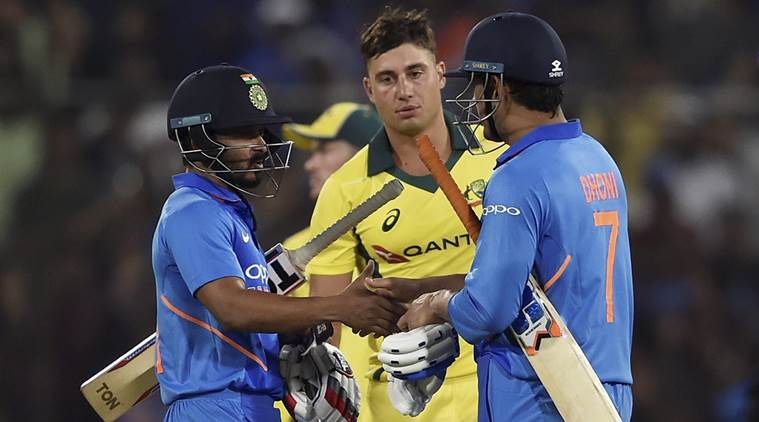
Someone with a wry sense of humour flashed a banner in the stands that read: “Good Bye MSD, thanks for the memories.” As if this was his farewell match, as if they wouldn’t see him again at this ground (they will in the IPL a few weeks from now), but the drift was clear. As the evening played out, they watched in routine awe a throwback Dhoni knock, not the unabashed buccaneer of his formative days, but the shrewd Shylock-like schemer of his later years. With a knock of calculated brilliance, he demonstrated that his finishing powers haven’t yet fully waned. Faded they might be, but not entirely finished. He still has that will to orchestrate a chase and the intuition to grasp crucial moments.
When he strode in after Rohit Sharma perished, India were suddenly in strife, from strolling smoothly to wobbling, from 80/1 to 95/3, which soon became 99/4. The nerves had begun to twitch in the stadium, as the arena was wrapped in sombre silence. In the past, or rather the Dhoni of the past, would have allayed their nerves, but these are different times. With him was Kedar Jadhav, not quite the most confidence-inspiring batsman around. It’s not a slight at him, but it’s how his start-stop, injury and inconsistency strewn career had panned out.
In effect, it was the ideal setting for India to tick the most glaring un-ticked box in their World Cup prelude. An opportunity to assess the adeptness of their middle-order, especially in a tricky chase as this, against an understated but deceptive Australian attack. By the end of the chase, they went a long way in establishing that the middle-order is not as thin as some might think. They didn’t lose another wicket as Dhoni and Jadhav stitched up an undefeated 141-run partnership, an alliance reminiscent of several Dhoni-Suresh Raina associations, in tempo as well as template. No fuss, no frills, just intelligent, methodical chasing.
Both looked utterly unflappable in the middle, absorbing the mounting pressure of the required run-rate, seeing out testy spells from Pat Cummins, Adam Zampa and Jason Behrendorff, tapping, ticking and nudging the odd single and two, before tearing into them with relish. As the partnership grew and the tension defused, Jadhav upped the ante with lusty blows. He’s not as much as a timer of the ball as a hitter of it, but to use a cricketing cliche, he packs a punch in his shots. For someone short and not exactly muscled—though he loves Salman Khan movies and WWE — he generates a lot of raw power, chiefly due to his balance, a stable base and powerful forearms. Whenever the ball was pitched up, he rudely hammered the bowlers. Zampa and Behrendorff would attest. Then, to show he was not all brawn and power, he guided Pat Cummins through the third-man boundary and over over the vacant slip-cordon. Then to flaunt his less-obvious gift of timing, he lofted Nathan Couler-Nile over midwicket, off the last delivery he faced. Later, Jadhav would admit that his attacking fervour was mellowed by Dhoni’s advice. “I guess I have tried to play more shots, but plenty of times he tells you that the team needs me to be more solid,” he explained.
Soon after the six, Dhoni wrapped up the chase with a brace of boundaries, exuding the kind of the freedom he once embodied. The first was a short-arm jab past point and the next a nonchalant punch over cover. It goes without saying that the crowd went bonkers, but for the barricaded they would have swarmed into the ground like an undulating wave.
A fire-and-ice combination
On a broader canvas, it was the perfect ice-and-fire middle-order combo India had been pursuing so frenetically in the last few months. Dinesh Karthik has looked a bit of harum-scarum, Ambati Rayudu disenchanted and Rishabh Pant impetuous. Jadhav has Dhoni-like nervelessness. Both of them are not without flaws, and in fairness it wasn’t a steep chase, but if they could combine to produce similar effort on a consistent basis, India’s batting line-up will look much stronger in the World Cup.
At least Virat Kohli needn’t worry about one of his middle-order spots. Just as Jadhav needn’t split hairs over his World Cup spot. Not yet fully locked, but he went a long way in asserting his utility. His peculiar bowling action, the bowling arm almost slugging the ground, and the uncanny partnership-breaking capabilities are well-storied, but for a batting colossus in domestic cricket, he risked plunging him to the bits-and-pieces category. Similar knocks would change perceptions, though on Saturday it was all Dhoni.
A concern though
Victorious as the chase might have been eventually, it provokes a few questions on the batting order. Like whether Virat Kohli should bat at number four so that there’s more depth, the colossuses of the line-up are equitably spread and not clustered into the top-three. Or whether Ambati Rayudu is temperamentally and technically adept at handling situations and high-quality attack when the team is under duress. Or whether, KL Rahul, who the skipper keeps raving about should bat at No 4.
It’s less straightforward than it seems to be, especially as Jadhav has illustrated his all-round utility, and Rayudu himself had notched up a few influential knocks in New Zealand. While India might have finalised it’s playing XI, doubts remains about the batting order. This, interminably, will be Kohli’s headache in the World Cup.
[“source=indianexpress”]







